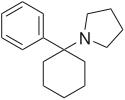Rolicyclidine (PCPy) is a dissociative anesthetic that is similar in effects to phencyclidine, but is slightly less potent and has fewer stimulant effects.[2] It instead produces a sedative effect described as being somewhat similar to a barbiturate, but with additional PCP-like dissociative, anaesthetic and hallucinogenic effects.[3] Due to its similarity in effects to PCP, PCPy was placed into the Schedule I list of illegal drugs in the 1970s, although it has never been widely abused and is now little known.
 | |
| Clinical data | |
|---|---|
| ATC code |
|
| Legal status | |
| Legal status |
|
| Identifiers | |
| |
| CAS Number | |
| PubChem CID | |
| DrugBank | |
| ChemSpider | |
| UNII | |
| KEGG | |
| ChEBI | |
| CompTox Dashboard (EPA) | |
| Chemical and physical data | |
| Formula | C16H23N |
| Molar mass | 229.367 g·mol−1 |
| 3D model (JSmol) | |
| |
| |
| (verify) | |
See also
editReferences
edit- ^ Anvisa (2023-07-24). "RDC Nº 804 - Listas de Substâncias Entorpecentes, Psicotrópicas, Precursoras e Outras sob Controle Especial" [Collegiate Board Resolution No. 804 - Lists of Narcotic, Psychotropic, Precursor, and Other Substances under Special Control] (in Brazilian Portuguese). Diário Oficial da União (published 2023-07-25). Archived from the original on 2023-08-27. Retrieved 2023-08-27.
- ^ Kalir A, Edery H, Pelah Z, Balderman D, Porath G (May 1969). "1-Phenycycloalkylamine derivatives. II. Synthesis and pharmacological activity". Journal of Medicinal Chemistry. 12 (3): 473–7. doi:10.1021/jm00303a030. PMID 4977945.
- ^ DEA Microgram Bulletin, 8, 143, 1975